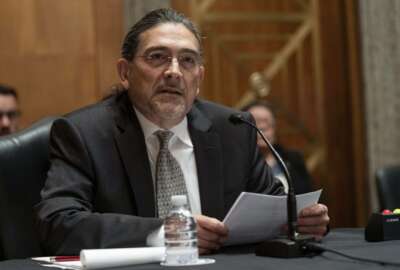Census nominee open to post-COVID telework in bid to improve workforce morale
Robert Santos, the Urban Institute's vice president and chief methodologist, told the Senate Homeland Security and Governmental Affairs Committee on Thursday that...
Best listening experience is on Chrome, Firefox or Safari. Subscribe to Federal Drive’s daily audio interviews on Apple Podcasts or PodcastOne.
President Joe Biden’s pick to run the Census Bureau told senators he would make workforce morale and post-pandemic telework arrangements key priorities to help the bureau recover from a “tumultuous” 2020.
Robert Santos, the Urban Institute’s vice president and chief methodologist, told the Senate Homeland Security and Governmental Affairs Committee on Thursday that if confirmed, he would work with the bureau’s human resources office and hold listening sessions with senior career staff to ensure employees feel supported “for the long term” and feel satisfied with their work.
Santos said bureau employees worked under “harrowing” conditions last year — in some cases, working seven days and putting in 80-hour weeks.
“There are morale issues, we know that. Morale is a symptom, it’s not the root cause of a problem. I would like to work with the Census career staff and the staff themselves to understand what are the root causes of job satisfaction and job dissatisfaction. What can we do?” Santos said.
The COVID-19 pandemic severely complicated the bureau’s ability to conduct the 2020 census, and led to multiple revisions of its operational timeline. The bureau submitted its apportionment data in April, and expects to complete its redistricting data in August.
The bureau’s last permanent director, Steven Dillingham, resigned in January following reports that he directed career staff to prioritize citizenship data at the Trump administration’s request ahead of producing decennial census data.
Santos said he’s open to the bureau offering employees bonuses and raises, but added that “the benefit of those types of rewards really wears off quite quickly,” and that he would also consider steps to improve workplace flexibilities and improve career paths.
“It’s more rewarding to provide individuals an opportunity to find an additional research path, or given COVID and the way folks have learned how to actually work better at home, provide flexibility in terms of work at home, remote work and things of that sort,” Santos said.
Santos previously served on the Census Advisory Committee for Professional Organizations and the Centers for Disease Control and Prevention’s National Center for Health Statistics Board of Scientific Counselors. If confirmed, he would be the first person of color to permanently lead the agency.
While the bureau recently announced that it would produce its 2020 redistricting data by Aug. 16, HSGAC Ranking Member Rob Portman (R-Ohio) urged Santos to ensure the bureau doesn’t postpone that data any further.
“Without the data, we can’t draw the lines. Literally, people don’t know what districts to run in, and constituents don’t know what district they’re going to be in,” Portman said.
Santos said he has “full confidence in the Census Bureau” to produce the data by the deadline, and said the bureau under his tenure would commit to making timeliness of data a larger aspect of its data products.
“Timeliness is an element of data quality that has only relatively recently been recognized as something that’s crucial, and that we need to take into account when we’re developing data products,” Santos said.
The bureau in the early stages of the pandemic launched a series of weekly “pulse surveys” meant to gauge COVID-19’s impact on public health and economic security.
The pulse surveys gathered data on employment status, consumer spending, food security, housing, education disruptions, as well as physical and mental wellness that will inform how federal, state and local agencies respond to the pandemic in the coming weeks and months.
Santos said he would also work with auditors at the Government Accountability Office to ensure planning for the 2030 count leverages some of the lessons learned from the 2020 count.
“Because the 2020 census was also the first fully digitized operation, there are a lot of quality indicators that can give clues about efficiencies that heretofore had not been available. So it’s critical to take a look at those, to analyze those and incorporate that,” Santos said.
Committee members also heard from Biden’s nominee to run Immigrations and Customs Enforcement. The Department of Homeland Security component hasn’t had a permanent leader in more than four years.
Ed Gonzalez, the sheriff of Harris County, Texas, said ICE under his leadership would take increased steps to root out violent extremism within the agency’s ranks, adding that similar reviews are happening at the state and local level nationwide.
“Across the board nationally, many law enforcement agencies are also grappling with this — not only the initial onboarding, but further check-ins throughout their career to make sure that things somehow aren’t going sideways or no longer fit the mission of the agency when it comes to a team member’s behavior,” Gonzalez said.
DHS launched an internal review in April to address the threat of domestic violent extremism within the agency workforce.
“It’s important that ICE does not work in a manner that in any way seeks to terrorize communities or anything of the sort. I think it’s important for us to be a professional agency,” Gonzalez said.
Copyright © 2025 Federal News Network. All rights reserved. This website is not intended for users located within the European Economic Area.
Jory Heckman is a reporter at Federal News Network covering U.S. Postal Service, IRS, big data and technology issues.
Follow @jheckmanWFED
Related Stories






